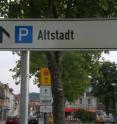Premium info for car drivers
Clogged access roads, packed car parks – traffic chaos is an everyday occurrence in many inner cities. In future, premium services will help drivers get to their destination quickly, all thanks to exclusive up-to-date information on vacant parking spaces or the weather conditions for the route punched into the navigation system. The information is transmitted via mobile Internet or the digital radio broadcasting system and can be displayed on the roadmap. Warning messages in response to dynamic speed limits would also be another option: if the driver exceeds the current limit – say a limit stipulated by a traffic management system – a warning lamp would come on. The transmission standard TPEG, short for Transport Protocol Experts Group, provides the basis for the service. Automakers and device manufacturers, information service providers, research institutions and others have joined forces to create a consortium to establish TPEG as a European and international standard. The advantage of TPEG is that it is much faster and more versatile than the conventional "Traffic Message Channel TMC" system. While TMC can distribute some 60 messages per minute, TPEG can handle 3,000.
The new premium services offer a wealth of information that is tailored to specific customer groups: drivers of a specific car brand, owners of a certain portable navigation device or members of an automobile club, all with access to information such as up-to-date parking-space data. Everyone will, however, still have access to information on tailbacks, roadworks and accidents, just as before. Specific customer groups can take advantage of other information, such as vacant parking spaces: researchers at the Fraunhofer Institute for Integrated Circuits IIS in Erlangen have encrypted these premium services. "The security concept adopted by individual suppliers can be totally different," says Birgit Bartel-Kurz, project manager at the IIS. "For instance, a manufacturer offering a low-cost retrofittable navigation system might well be less concerned whether the services can be used without authorization than say a leading automaker. We have encrypted the services offered by individual suppliers using encapsulation. If a key for a certain type of device is cracked, the others are still secure." The Conditional Access System HECA manages with minimal additional information – the encrypted file itself is no larger than the unencrypted file. At the IBC international forum in Amsterdam the researchers will be showcasing the system with their partners from Bayerische Medientechnik GmbH BMT (Hall 8, Stand C81).
